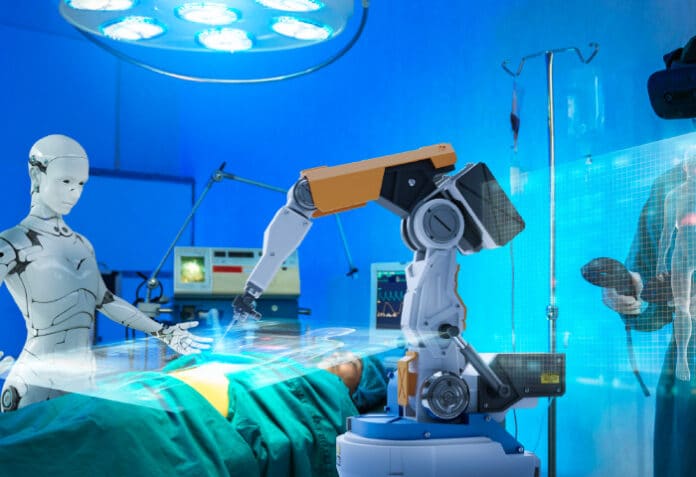Here are some insights into how AI can help with personalised medicine, drug discovery and patient care. There are a few challenges on the path, though.
Artificial intelligence (AI) has emerged as a disruptive force within the healthcare sector, bringing about a paradigm shift in the way patients are cared for and medical diagnostics are conducted. By integrating sophisticated technologies such as deep learning, machine learning, and natural language processing, artificial intelligence (AI) has enabled unparalleled progress in the field of medical science. Its influence extends to numerous aspects of healthcare, including personalised treatment approaches and enhanced diagnostic precision, thereby substantially improving treatment outcomes.
Particularly in drug discovery and development, AI has arisen as a formidable force in healthcare, transforming the way in which we approach treatments. The integration of AI into healthcare, nevertheless, presents substantial privacy and security concerns.
AI facilitates the acceleration of drug screening and development through the analysis of extensive data sets. The system streamlines virtual screening, expedites the identification of compounds with therapeutic potential, and forecasts molecular interactions.
AI facilitates personalised medicine through the analysis of genomic data and patient profiles, enabling the development of targeted therapies. By discerning biomarkers, forecasting drug reactions, and customising remedies for specific patients, it enhances effectiveness while mitigating adverse effects.
AI optimises the design of clinical trials through the analysis of patient data, which enables the identification of appropriate participants, prediction of trial outcomes, and streamlining of trial protocols. This phenomenon expedites the process of medication development and improves the rate of success in clinical trials.
Algorithms powered by artificial intelligence analyse the mechanisms of action of existing medicines to identify potential candidates for drug repurposing. This methodology investigates novel therapeutic applications for currently available medications, which may expedite the development of treatments for a wide range of ailments.
Obstacles in the advancement of safety and efficiency need to be considered while defining the priorities for stakeholders:
- To protect patient information, robust encryption and cybersecurity measures must be implemented
- AI algorithms that are impartial and transparent must be developed by utilising representative and diverse data sets
- There should be increased compliance with data privacy standards and regulations
- In order to mitigate risks and ensure compliance, AI systems should be subjected to ongoing auditing and monitoring
By employing AI in the process of drug discovery and development, a healthcare revolution is imminent. Nevertheless, it is crucial to overcome the privacy and security obstacles to fully exploit its capabilities.
The impact of technology on medical diagnostics
AI has revolutionised medical diagnostics by providing a paradigm shift in diagnosis speed, accuracy, and efficiency. Key domains where AI is reshaping medical diagnostics include the following.
Medical imaging: Algorithms powered by artificial intelligence analyse medical images with extraordinary accuracy, including X-rays, MRIs, and CT scans, assisting in the early detection and diagnosis of diseases such as cardiovascular disorders, cancer, and neurological disorders. By detecting irregularities and patterns that may elude the naked eye, they aid radiologists by reducing diagnostic errors and improving the strategy for treatments.
Diagnostic assistance: Healthcare professionals are assisted in the interpretation of clinical data, lab results, and patient records by diagnostic instruments enabled by AI. These systems facilitate the generation of differential diagnoses, the identification of abnormalities, and the prediction of potential health hazards, thereby providing physicians with invaluable information to make well-informed decisions.
Genomic analysis: By rapidly analysing enormous genomic data sets, AI facilitates the identification of hereditary susceptibilities to diseases, allowing for the development of individualised treatment strategies and targeted therapies that are customised to the genetic composition of each person.
Revolutionising healthcare with AI
Preventive care and predictive analytics are crucial in developing customer-centric telemedicine. By analysing the patterns in patient data, AI-powered predictive models foretell potential health problems. Early intervention by healthcare providers, through the implementation of preventive measures and lifestyle interventions, can effectively mitigate risks and impede the progression of diseases.
Telemedicine platforms enabled by artificial intelligence enable patients to access healthcare services from any location through remote consultations. Additionally, healthcare providers can access continuous data regarding patients’ vital signs through wearable devices fitted with AI algorithms, enabling them to implement proactive interventions.
Predictably, the effectiveness and dependability of AI-driven solutions in healthcare will be further enhanced through the implementation of refined data collection methodologies, increased collaborations between tech companies and healthcare providers, and advancements in AI algorithms.
Personalised medicine: Tailoring treatments with AI
What is personalised medicine?
Traditionally, medicine has followed a ‘one-size-fits-all’ approach, with the same treatment given to everyone with the same disease. But this doesn’t take into account the vast differences between individuals. Personalised medicine aims to overcome this limitation by tailoring treatments to each patient’s unique characteristics.
How does AI come in?
AI excels at analysing large amounts of data, much more than any human doctor could. This makes it ideal for personalised medicine, where doctors need to consider a patient’s entire medical history, genetic makeup, environmental factors, and more. AI can use this data to:
Identify the best treatment options: By analysing data from clinical trials and real-world patients, AI can predict which treatments are most likely to be effective for a specific individual.
Optimise drug dosage: AI can analyse a patient’s individual factors to determine the safest and most effective dosage of a medication.
Minimise side effects: AI can help identify patients who are at risk for certain side effects from a particular treatment, allowing doctors to choose a different approach.
Develop new treatments: AI can be used to analyse vast amounts of genomic and biological data to identify new drug targets and develop personalised therapies.
Here are some examples of AI in personalised medicine.
Cancer treatment: AI is being used to develop targeted therapies for cancer based on a patient’s genetic mutations. This allows for more effective treatment with fewer side effects.
Cardiovascular disease: AI can analyse medical images and patient data to predict a patient’s risk of heart attack or stroke, allowing for preventative measures to be taken.
Mental health: AI is being used to develop personalised treatment plans for patients with depression, anxiety, and other mental health conditions.
AI-driven diagnosis and early detection of diseases
AI technologies can be leveraged to analyse medical data and identify potential health issues at an early stage. Here are some examples and use cases to illustrate the concept
Medical imaging and radiology
AI algorithms can analyse medical images, such as X-rays, CT scans, and MRIs, to detect anomalies or patterns indicative of diseases. For instance, Aidoc’s platform utilises deep learning to assist radiologists in identifying abnormalities in medical images, helping to expedite the diagnosis of conditions like cancer, fractures, or vascular issues.
Pathology and histopathology
AI can aid pathologists in analysing tissue samples for signs of diseases, particularly in cancer diagnosis. PathAI is an example of a platform that employs machine learning to assist pathologists in detecting cancerous cells in pathology slides, improving accuracy and speed in diagnosis.
Genomic analysis
AI is used to analyse genomic data to identify genetic markers associated with various diseases. Companies like 23andMe and AncestryDNA leverage AI algorithms to provide insights into individuals’ genetic predispositions to certain conditions, enabling early detection and preventive measures.
Clinical decision support systems
AI-driven decision support systems analyse patient data, including medical history, symptoms, and test results, to assist healthcare professionals in making more accurate diagnoses. IBM Watson for Oncology is one such system that provides treatment recommendations based on a comprehensive analysis of medical literature and patient data.
Remote patient monitoring
Wearable devices equipped with AI algorithms can continuously monitor physiological parameters like heart rate, blood pressure, and glucose levels. These devices provide real-time data to healthcare providers, enabling early detection of abnormalities and timely intervention for chronic conditions.
Chatbots for symptom triage
AI-powered chatbots engage with patients to collect information about their symptoms and medical history. Babylon Health’s chatbot, for instance, assists users in assessing their symptoms and directs them to appropriate healthcare resources, promoting early detection and intervention.
Early detection of neurological disorders
AI can analyse data from various sources, including brain imaging and behavioural patterns, to detect early signs of neurological disorders such as Alzheimer’s disease or Parkinson’s disease. This early identification facilitates early intervention and treatment planning.
Monitoring epidemics and disease outbreaks
AI algorithms analyse vast amounts of data, including social media posts, news articles, and healthcare records, to detect patterns indicative of disease outbreaks. This proactive monitoring helps public health officials respond quickly to potential epidemics and implement preventive measures.
Drug discovery and development
AI is employed in drug discovery to analyse biological data and predict potential drugs more efficiently. Atomwise, for example, uses AI for virtual screening of potential drug compounds, accelerating the drug discovery process.
Privacy and security challenges in health AI
Data privacy concerns arise from health AI’s reliance on confidential patient information. Ensuring patient confidentiality and adhering to data privacy regulations, including HIPAA in the United States, presents a formidable obstacle. It is of utmost importance to anonymise and securely store this data in order to protect patient privacy.
Cybersecurity threats: The healthcare sector is confronted with heightened cybersecurity risks due to the digitisation of data. AI-based networks and systems that store patient data are vulnerable to intrusions, risking data theft or manipulation, jeopardising patient safety and confidentiality.
The implementation of AI algorithms in healthcare has the potential to unintentionally sustain biases that are inherent in the training data, thereby resulting in disparities in treatment or diagnosis. It is critical to mitigate bias by ensuring transparency and impartiality in AI decision-making processes.
Regulatory compliance: Strict regulatory frameworks must be adhered to by health AI technologies. Healthcare providers and software developers must ensure that AI-powered solutions conform to regulatory standards in tandem with the changes in these standards.
The role of AI in drug discovery and development
AI is transforming drug discovery and development, revolutionising traditional methods and accelerating the process of bringing new drugs to market. Here are the key aspects highlighting the role of AI in this crucial domain.
Target identification and validation
Traditional approach: Identifying and validating potential drug targets involves extensive biological research.
AI contribution: AI algorithms can analyse vast biological data sets, including of genomic and proteomic data, to identify and prioritise potential drug targets. For example, machine learning models can predict the likelihood of a specific protein being a viable target for drug intervention based on its role in disease pathways.
Drug design and optimisation
Traditional approach: Designing and optimising drug compounds traditionally involves time-consuming trial and error processes.
AI contribution: AI-driven platforms, like generative adversarial networks (GANs) and deep learning models, can assist in designing novel drugs by predicting molecular structures with desired properties. Atomwise, for instance, employs AI for virtual screening of potential drug compounds, saving time and resources in the early stages of drug discovery.
Drug repurposing
Traditional approach: Discovering new uses for existing drugs typically requires extensive clinical testing.
AI contribution: AI can analyse large data sets, including clinical records and molecular information, to identify existing drugs that may be repurposed for new therapeutic purposes. This can significantly shorten the time and cost associated with bringing a drug to market. For example, BenevolentAI utilises AI to identify existing drugs that may be effective against different diseases.
Predicting drug-drug interactions and side effects
Traditional approach: Assessing potential drug interactions and side effects traditionally involves conducting extensive clinical trials.
AI contribution: AI algorithms can predict potential drug interactions and side effects by analysing biological and chemical data. This helps in optimising drug combinations and minimising adverse effects. IBM Watson for drug discovery is an example of a system that uses AI to analyse scientific literature and databases to predict potential interactions and side effects.
Clinical trial optimisation
Traditional approach: Recruiting suitable patients for clinical trials and optimising trial parameters is a complex and time-consuming process.
AI contribution: AI assists in patient recruitment by analysing diverse data sets to identify suitable candidates. Additionally, machine learning models can optimise clinical trial protocols, helping to streamline the process and reduce costs. Tempus, for instance, uses AI to optimise clinical trial design and execution.
Drug manufacturing and quality control
Traditional approach: Ensuring the quality and consistency of drug manufacturing involves extensive manual testing and quality control procedures.
AI contribution: AI is employed for process optimisation in drug manufacturing, ensuring quality control, and minimising variations in production. This leads to more consistent and cost-effective manufacturing processes.
AI has the potential to revolutionise healthcare by improving diagnostic accuracy, reducing the time taken for diagnosis, and enabling personalised treatment plans. As AI-based technologies continue to evolve, it is crucial to address ethical considerations, data privacy concerns, and ensure collaboration between AI systems and healthcare professionals for optimal patient care.




